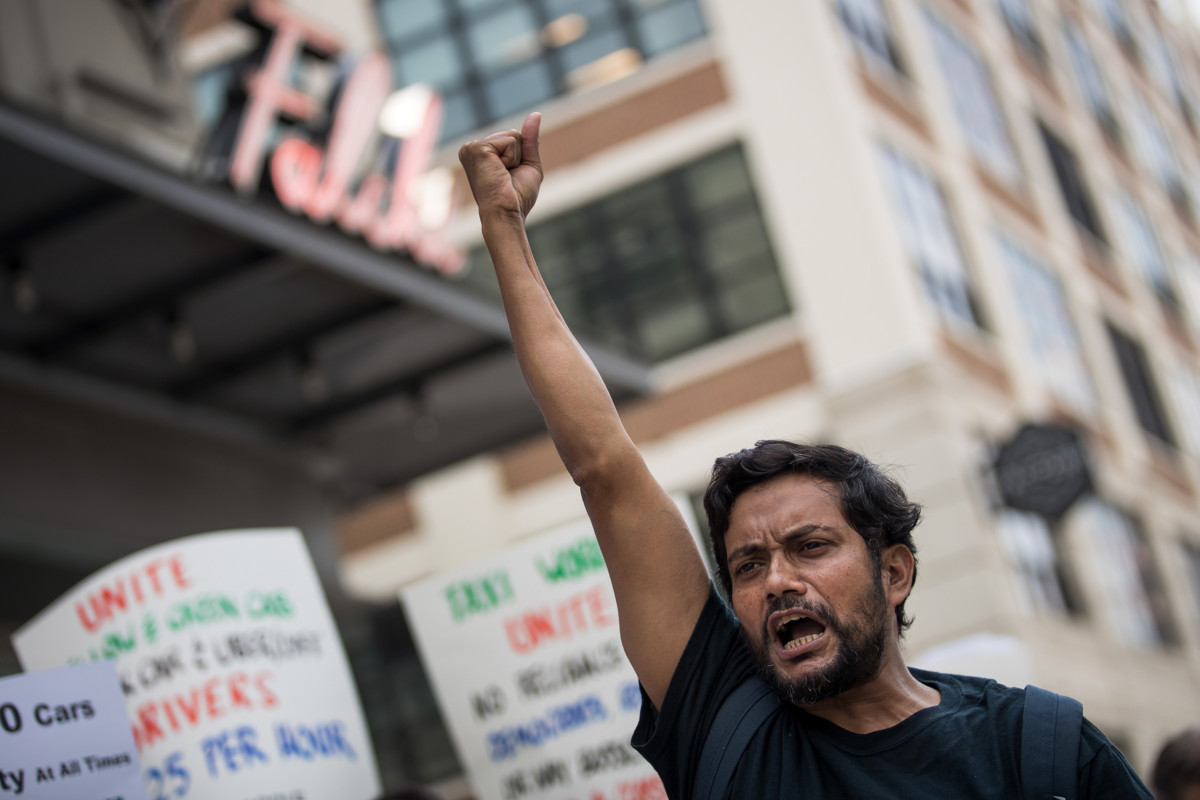Did you know that Truthout is a nonprofit and independently funded by readers like you? If you value what we do, please support our work with a donation.
Ride-hailing companies like Uber and Lyft poured more than $1 million this year into lobbying New York City officials. But that influx of cash couldn’t compete with the dedication of the city’s cab drivers. After years of agitating for ride-sharing regulations to protect their livelihoods, New York taxi workers have finally won a vehicle cap and pay floor — a landmark victory that they hope will allow all city drivers to make a sustainable living.
The win belongs to the drivers, like the ones of New York’s iconic yellow cabs, who have banded together as the New York Taxi Workers Alliance, or NYTWA. The union has a remarkable track record, with victories including a living wage standard and a driver’s bill of rights. The union — made up mostly of Muslim immigrants — also sparked one of the most powerful protests of U.S. President Donald Trump when drivers refused to pick up passengers at JFK airport airport in response to the Muslim ban.
That particular strike brought national attention to the tension between ride-hailing companies and the city’s taxi workers. As cab drivers protested the bigotry that threatened their own lives, Uber announced it would cut surge pricing to the airport, effectively dimming the effects of the strike. The company’s users were outraged, causing #DeleteUber to trend on social media while critics shared screenshots as they removed the app from their phones.
The strike was only a flashpoint in a battle between drivers and the Silicon Valley corporations that are single-handedly revising city transit with little oversight. Drivers have long been concerned about how ride-hailing companies like Uber and Lyft are changing their workplace landscape.
As the popularity of ride hailing apps increased in New York City, so too did the number of cars available on the street. A once tightly-regulated market exploded in size, as up to 40 percent of ride-hailing cars congested city streets but remained unoccupied by passengers. Fluctuating pricing — a cornerstone of Uber’s business model — created a race to the bottom for worker wages.
Meanwhile, the value of a taxi medallion — which the city issues in limited quantities — plummeted from $1.3 million in 2014 to less than $200,000 this year. And it’s not just cab drivers. Uber drivers also report seeing their incomes nosedive, and a city-commissioned study found that 85 percent of app-based drivers make less than the proposed wage floor of $17.22 an hour. Driving once offered a solid path to financial stability in New York. But these rapid changes, coupled with the lack of regulations, meant that the industry was no longer able to offer a sustainable living, leading to widespread despair among drivers.
A recent spate of suicides underscored the urgent need for a solution. Six drivers — Alfredo Perez, Danilo Castillo Corporan, Doug Schifter, Nicanor Ochisor, Yu Mein Chow, and Abdul Saleh — have died since November.
Before his death, Schifter posted a haunting note on Facebook detailing the factors, from corporate greed to political ignorance, that led to his financial ruin. “They are destroying many thousands of families financially,” Schifter wrote in warning. “I don’t know how else to try to make a difference other than a public display of a most private affair.”
The regulations have been life-or-death for taxi drivers for some time now, NYTWA Executive Director Bhairavi Desai told In These Times after the win. “Part of what’s happened over the past three years is that taxi drivers have been made to feel invisible,” Desai said. “One of the most important progresses we made is putting the drivers back in front— as the visible face of their industry and in the organizing campaigns to regulate these companies.”
Cab drivers organized more than 20 actions in front of New York City Hall, including vigils for their fellow workers pushed to suicide, forcing politicians to reckon with the economic crisis affecting some of the city’s most marginalized workers. And their success in passing legislation is a credit to their grassroots organizing. A 2015 effort by New York Mayor Bill de Blasio to regulate ride-sharing wasn’t as fruitful, unsurprising giving the hefty lobbying power employed by the Silicon Valley companies.
Finally, three years later, the drivers have won sweeping legislation that will cap the number of for-hire vehicles on the road for a year while city officials study how app-based services affect the industry. The legislation also includes a minimum pay standard that will force ride-sharing companies to ensure their drivers can make a reasonable living.
It’s all a testament to the movement built by the city’s drivers. “This victory belongs to Douglas, to Abdul, to Nicanor, to Alfredo, to Kenny, to Danilo,” Desai said in a statement for the NYTWA. “This victory belongs to the thousands of NYTWA members scraping by to feed their families, who took time away from their cars, losing precious and hard fought income to be on the streets standing together and standing up for each other.”
Media that fights fascism
Truthout is funded almost entirely by readers — that’s why we can speak truth to power and cut against the mainstream narrative. But independent journalists at Truthout face mounting political repression under Trump.
We rely on your support to survive McCarthyist censorship. Please make a tax-deductible one-time or monthly donation.
